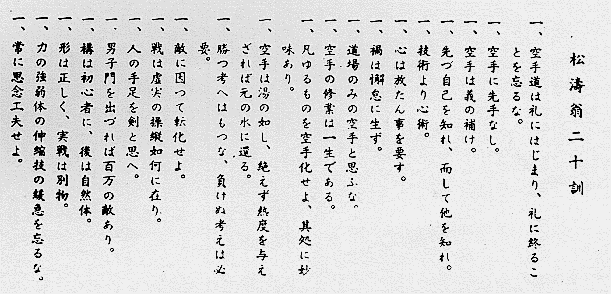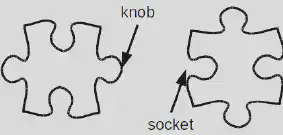First know yourself, then know others
空手は義の補け

This is the fourth in a series of posts to examine Shotokan’s niju kun, Gichin Funakoshi’s list of 20 guiding principles for karate.

The fourth principle is:
先づ自己を知れ而して他を知れ
In Romaji:
Mazu jiko o shire, shikashite ta o shire.
In English, I think the best translation is:
First know yourself, then know others.
This is an obvious reference to Sun Tzu’s “Art of War” where, in the third chapter (“Offensive Strategies”), he writes:
If you know the enemy and know yourself, you need not fear the results of 100 battles. If you know yourself, but not the enemy, for every victory gained, you will also suffered to defeat. If you know, neither the enemy nor yourself, you will succumb in every battle.
Since Funakoshi was a martial artist, and a schoolteacher whose specialty was Japanese and Chinese philosophy, he was naturally familiar with Sun Tzu. But when you look closely, Funakoshi is telling us more. He’s not just telling us to know ourselves and our enemy. He’s telling us to know ourselves and then our enemy. He’s added an element of order, or priority. Why?
When you begin karate training, there is no “enemy.” You’re focused on learning the basics and fixing your own mistakes. As you continue your training, you find you are better at some techniques than others. That’s good. Your strengths become your “go-to” techniques while your weaknesses become your list of things to work on in training. Regardless, it’s important to know your own capabilities and limitations before you even think about engaging an “enemy.”
But once an enemy is identified, it’s foolish to rush into battle without knowing his strengths and weaknesses.
- If he’s an extremely good grappler, stay outside grappling range.
- If he has a bad hip, he’s unlikely to kick with the other leg since that would put weight on the bad hip.
- etc.
Once you know both your strengths and weaknesses and those of the enemy, then you can start to put them together. Like pieces of a jigsaw puzzle, you need to match the “knobs” of your strengths to the “sockets” of the enemy’s weaknesses, while denying the enemy opportunities to do the same.

But there’s more: It’s not just practical advice; it’s also philosophical.
First, we should never seek to have enemies. In fact, it would be preferable to go through life never having an enemy. And so long as there is no enemy, you may as well concentrate on knowing yourself.
Second, we should not spend time seeking fault in others or being jealous of their gifts. Instead, we should concentrate on bettering ourselves. When Sensei compliments someone else’s technique, don’t waste time with jealousy. Instead, learn from the example the other person has set. Likewise, when Sensei corrects you, don’t point out that the other guy is doing it wrong too. Just fix it.